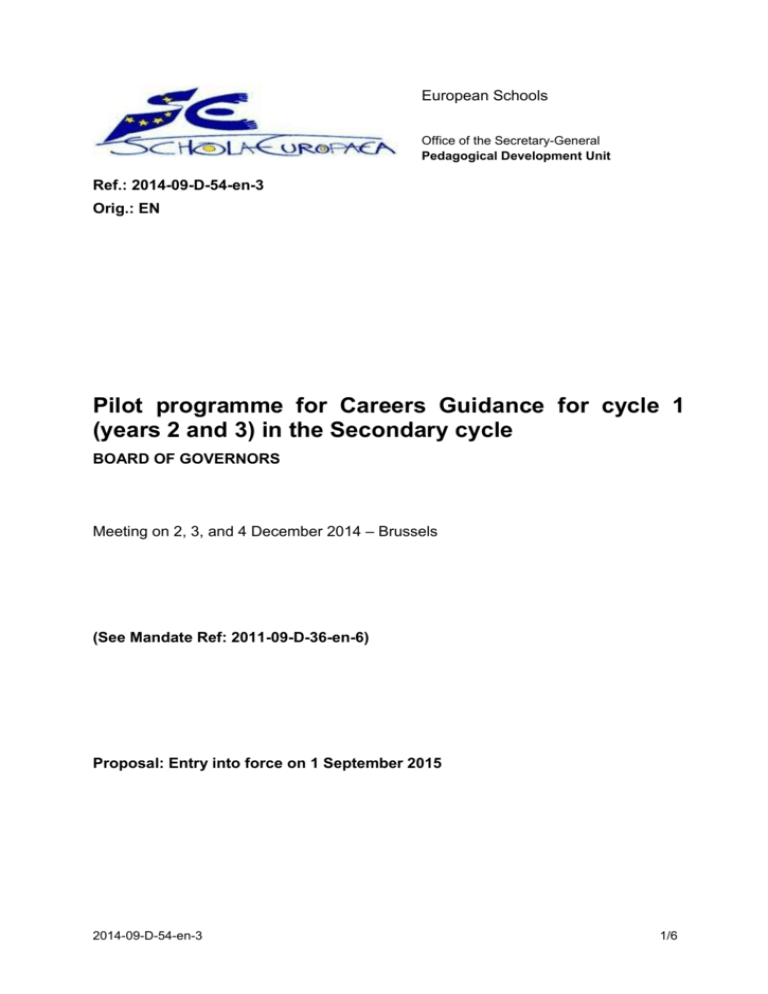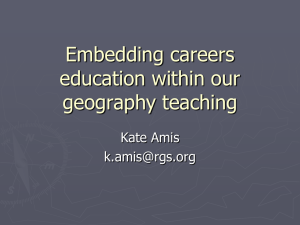Pilot programme for Careers Guidance for cycle 1
advertisement

European Schools Office of the Secretary-General Pedagogical Development Unit Ref.: 2014-09-D-54-en-3 Orig.: EN Pilot programme for Careers Guidance for cycle 1 (years 2 and 3) in the Secondary cycle BOARD OF GOVERNORS Meeting on 2, 3, and 4 December 2014 – Brussels (See Mandate Ref: 2011-09-D-36-en-6) Proposal: Entry into force on 1 September 2015 2014-09-D-54-en-3 1/6 Introduction: In the document 2011-09-D-36-en-6 concerning Careers Guidance, approved by the Board of Governors in April 2012, the Working Group Careers Guidance was mandated to develop a pilot project for cycle 1 (years 2 and 3) of the Secondary school. This Careers Guidance syllabus focuses on the knowledge and the competences to be attained at the end of cycle 1. The syllabus has been developed according to the same principles as the syllabi for cycle 2 and 3, approved in February 2014. The syllabus includes general objectives, didactic principles, learning objectives, contents and assessment. It presents the careers guidance items students will be expected to learn, and describe the knowledge and skills they will develop to be able to make appropriate choices. The structure of the syllabus is intentionally brief but is expanded through a commentary (annex). The syllabus for Careers Guidance cycle 1 will come into force in September 2015. It may be implemented in all schools and will be assessed after a period of three years. 1. General objectives: The European Schools have the two objectives of providing formal education and of encouraging pupils’ personal development in a wider social and cultural context. Formal education involves the acquisition of competences – knowledge, skills and attitudes across a range of domains. Personal development takes place in a variety of spiritual, moral, social and cultural contexts. It involves an awareness of appropriate behaviour, an understanding of the environment in which pupils live, and a development of their individual identity. These two objectives are nurtured in the context of an enhanced awareness of the richness of European culture. Awareness and experience of a shared European life should lead pupils towards a greater respect for the traditions of each individual country and region in Europe, while developing and preserving their own national identities. The pupils of the European Schools are future citizens of Europe and the world. As such, they need a range of competences if they are to meet the challenges of a rapidly-changing world. In 2006 the European Council and European Parliament adopted a European Framework for Key Competences for Lifelong Learning. It identifies eight key competences which all individuals need for personal fulfilment and development, for active citizenship, for social inclusion and for employment: 1. 2. 3. 4. 5. 6. 7. 8. communication in the mother tongue communication in foreign languages mathematical competence and basic competences in science and technology digital competence learning to learn social and civic competences sense of initiative and entrepreneurship cultural awareness and expression 2014-09-D-54-en-3 2/6 The European Schools’ curriculum seeks to develop all of these key competences in the students. Within this framework, the Careers Guidance programme focuses on specific elements of the key competences with the aim of facilitating students’ future participation in the wider world of work. 2. Didactic principles: Careers guidance activities are based on the following didactic principles: - the pupils are assisted in assessing their individual strengths, weaknesses, skills and interests - the pupils are assisted in taking responsibility for their own future - the pupils are encouraged to research, select, organise and evaluate information regarding study and careers choices - the pupils are encouraged to appreciate the way they relate to other people, their societies and cultures - the pupils use ICT as a teaching/learning instrument in research and through specific programmes, e.g. to stimulate self awareness The above list is not exhaustive and not in order of importance. 3. Learning objectives: Cycle 1 By the end of the first cycle, the student should be able to 1. identify factors involved in career choices 2. explore his/her knowledge, skills and attitudes 3. understand and organise information from a given range of sources 4. explore a variety of career areas 5. show basic awareness of equal opportunities in subject and career choices and recognise stereotyping 6. recognise and use basic study skills 7. make informed and coherent decisions about successive option choices 4. Contents: Cycle 1 By the end of the first cycle, the student should have acquired 1. basic awareness of his/her capacities, interests and aptitudes 2. knowledge of the school curriculum and its relevance to subject choices 3. knowledge of course content of subjects in cycles 1 and 2 4. awareness of possible consequences of his/her cycle 2 choices for cycle 3 and for Higher Education 5. awareness of career areas 6. basic study skills 2014-09-D-54-en-3 3/6 5. Annex: Commentaries The following section comments on some parts of the syllabus where clarification is necessary. Quotations from the syllabus are in bold and in italics. a) Learning Objectives Cycle 1: Identify factors involved in career choices Factors include careers teachers, class teachers, subject teachers, external careers advisors, careers institutions, parents, careers guidance syllabus, printed and electronic sources. Make informed and coherent decisions about successive option choices Some choices for cycle 2, such as mathematics 4, may exclude future studies. Normally, subjects not chosen for cycle 2 cannot be chosen as options for cycle 3. Explore a variety of career areas Examples of career areas are health, finance, design, law, communications and engineering. 2014-09-D-54-en-3 4/6 FINANCIAL SHEET Forecast Financial Impact S2: 2 periods1 career guidance Around 100 classes across all schools 200 periods in total for S2 S3: 6 periods career guidance Around 100 classes across all schools 600 periods in total for S3 In total and in regime cost for S2 and S3: Average cost for a period (C): C1 = 272.62 € one extra period for a month. seconded teacher old statute C2 = 221.97 € one extra period for a month. seconded teacher new statute C= ((C1/4)+(C2/4))/2= 61.82 € Total periods in S2 and S3 (TP): 800 Total cost: TPxC = 49456 € 1 Please consider that in all this calculation the term “period » should be interpreted as a « one shot » period (one single lesson of 45 minutes) and not a weekly period all over the year. 2014-09-D-54-en-3 5/6 OPINION OF THE BOARD OF INSPECTORS (SECONDARY) The Board of Inspectors (Secondary) expressed a favourable opinion on the proposed “Pilot programme for Careers Guidance for cycle 1 (years 2 and 3) in the Secondary cycle”. OPINION OF THE JOINT TEACHING COMMITTEE The Joint Teaching Committee expressed a favourable opinion on the proposed pilot programme. OPINION OF THE BUDGETARY COMMITTEE The Budgetary Committee acknowledged the importance of early guidance for pupils and of better guidance to avoid failures, which had a cost for the system. It recommended that the Board of Governors should approve the proposal and its financial cost. PROPOSAL The Careers Guidance Working Group was mandated by the Board of Governors at its April 2012 meeting, to devise a pilot project for cycle 1 (years 2 and 3) of the secondary cycle. The Board of Governors is therefore invited, in line with that mandate, to approve the Careers Guidance pilot syllabus for cycle 1, with entry into force on 1 September 2015, in accordance with the recommendations made above. The pilot project may be implemented by all the schools and will be evaluated after a period of three years. 2014-09-D-54-en-3 6/6






